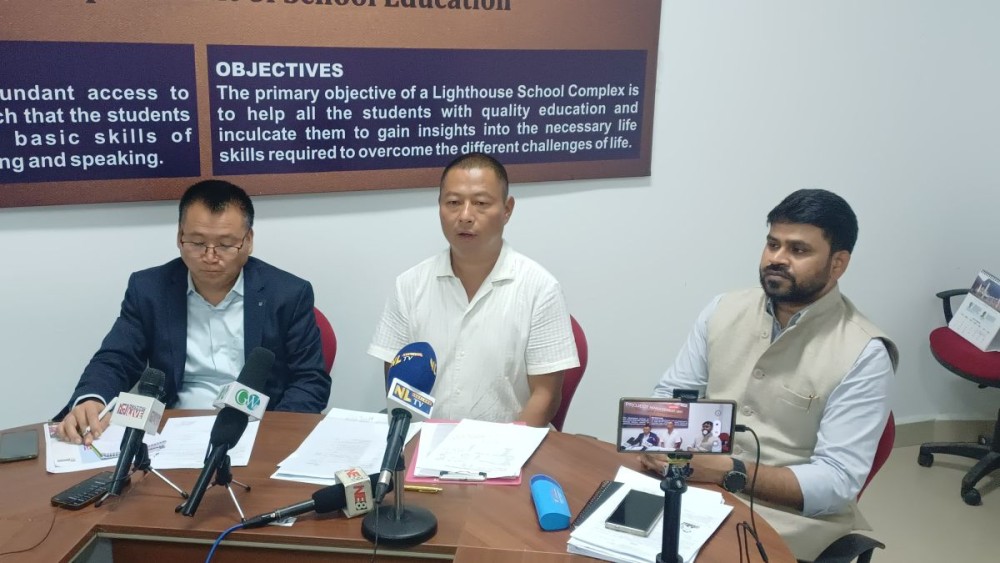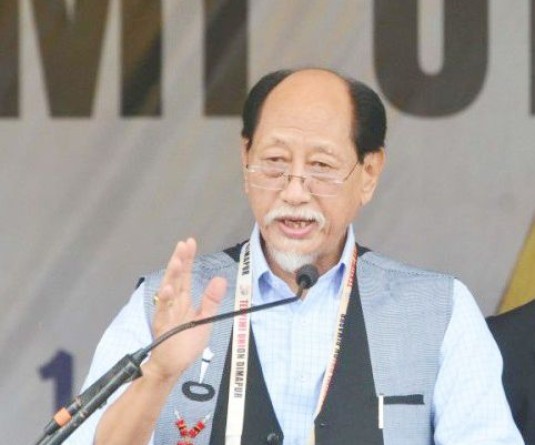Advisor Kekhrielhoulie Yhome, Principal Director Shashank Pratap Singh and State Mission Director L Jamithung Lotha during a press conference held on September 19.

Morung Express News
Kohima | September 19
As the protest by Nagaland RMSA 2016 batch teachers entered its tenth day, Advisor for School Education Kekhrielhoulie Yhome urged them to return to classrooms and not let students suffer while the legal process over their demand for pay scale takes its course.
Addressing a press conference in Kohima, Yhome expressed solidarity with the teachers, stating, “I was also once a teacher like you.” He was joined by Principal Director Shashank Pratap Singh and State Mission Director L Jamithung Lotha.
Yhome said he had requested the teachers earlier in the day to resume classes with barely two months left in the academic session, noting that many government school students come from the poorest families. “They want to get education by all means, so it breaks my heart that those who are in our schools are without teachers today,” he stated.
He clarified that 367 protesting teachers were recruited under the centrally sponsored RMSA scheme in 2016 alongside hundreds of others on contractual terms. Teachers who have gone to court are receiving Rs 31,350 per month, while non-petitioners draw Rs 25,000. “Technically what they are asking is, they want full employment, full government of Nagaland employment, so they have gone to court, and the court has advised the Government of Nagaland to give scale pay, so accordingly the Government of Nagaland has put up a review petition, therefore the case is sub judice,” he said.
The Advisor stressed that their appointment is purely “contingency” and can be terminated with one month’s notice, adding that “they have no right to ask for pay scale and for employment as a regular employee of the Government of Nagaland.” He referred to the bond signed at appointment, which bars agitations for unreleased central funds, allows termination after 15 days’ absence and does not permit objections to transfers. “Contingency means they are contingency teachers, we don’t have enough teachers, therefore they were engaged, and their engagement is purely on contract basis,” he said.
He informed that the court’s division bench had directed the teachers to approach the State, and the Government of Nagaland has approached a full bench. “It has not been listed, but the review petition has been entered,” Yhome stated.
The Advisor also remarked that open protests often attract “individuals who may not fully understand the issue but add unnecessary noise and slander.”
Solution also comes with financial implications
Yhome maintained that the government is not against the teachers’ cause but procedures must be followed. A committee headed by the Principal Secretary under the Chief Minister’s initiative has been formed. “Solution also comes with more financial implications,” he said, noting that most of the school education budget goes to salaries but expressing optimism the government can consider the case.
He said teachers appointed between 2010 and 2018 under “different styles and manners and different modes of engagements” are being examined case by case by a departmental committee. He added that the use of terms such as “regular, contingency, substitute, adult and skilled teachers” has created confusion within schools.
While appreciating the sincerity of many contingency teachers and crediting them for the improvement in matriculation results from 37% to 47%, he also pointed to evidence of some RMSA teachers “who have not joined their school even for a single day.”
We have inherited a problem
Yhome said the department has “inherited” a problem from predecessors. “There is no need to blame anybody, but the mess and the ruckus which has been created is affecting the State’s fiscal health also,” he said. “It is not like we are refusing to do it because there are financial implications, what we are just explaining is that there will be ramifications and for that we cannot make a hasty decision.”
On the role of mediators
While appreciating the role of civil society and student bodies, Yhome cautioned against mediation that could “repeat the mistakes of the past,” referencing the SSA agitation between 2010 and 2013. He said interference by public organisations, ultimatums and “emotionally blackmailing the government” without understanding procedure has created problems.
Reassuring the teachers that their “concerns, pain and frustrations” are noted, Yhome said, “We are here to work out a solution and we will have to wait for the due process of law to also take place.” He appealed to the teachers to understand and return to their classes as the future of students is at stake.






